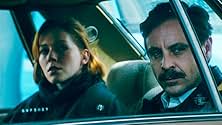The Gold
- Série télévisée
- 2023–2025
- 58min
Série dramatique inspirée des événements réels entourant le vol de la Brink's Mat de 1983 et de l'histoire remarquable qui continue après.Série dramatique inspirée des événements réels entourant le vol de la Brink's Mat de 1983 et de l'histoire remarquable qui continue après.Série dramatique inspirée des événements réels entourant le vol de la Brink's Mat de 1983 et de l'histoire remarquable qui continue après.
- Nomination aux 1 BAFTA Award
- 4 nominations au total
Parcourir les épisodes
Avis à la une
Many stories of grand thefts follow the planning of the event; the heist itself provides the climax. But the Brinks Mat robbery (the largest theft of gold ever seen in the UK at the time) was not well-planned; instead, a group of petty (but not particularly attractive) criminals got lucky when aiming for a lesser haul. Nonetheless, they managed to launder most of their ill-gotten gains; though eventually, the police tracked down many of those involved. 'The Gold', a fictionalised rendition of these events, thus begins in a low key way: the crime happens right at the start, before we really care. But as the drama continues, it becomes increasingly gripping, as we come to understand the motivations and character of those involved; and it also becomes clear that for many, this is not just a game but a matter quite literally of life and death. The portrayals are somewhat stylised but never completely implausable; by the end, I was hooked. Hugh Bonnevillle is good as the plodding-but-decent policeman leading the investigation. In case you're tempted to glamourise the villains, it's worth noting that Kenneth Noye, released after sentence, later murdered a man in a road-rage incident.
For once we get a BBC police drama that is not stuffed with the latest modern cliches to make it more 'now' and 'authentic' and in which the direction, script and acting are not noticeably produced by the same sausage machine. In many respect The Gold really is several cuts above yer standard BBC fare. But it does have its flaws.
The first of these has been highlighted by other reviewers: for some reason the 'villains' - Noye and Palmer in particular - are sympathetically portrayed as somewhat loveable characters who just happen to be on the wrong side of the law. They were nothing of the kind: partners, mistresses and associates are on record that both were hard, violent, cruel and ruthless.
Noye is still alive. Palmer was murdered at his home in the south of England, the victim of other gangsters he had upset once too often as he made his fortune, reputed to have been £300m.
Noye was acquitted of murdering an undercover police officer but later jailed for a 'road rage' murder. Noye was - make that is - not a nice guy and certainly not a man you would care to cross.
Such characterisation of villasin is not new, of course, and Tinseltown and television have long used that schtick to sex up their cops and robbers drama. A good example which comes to mind is 1967's Bonnie And Clyde starring Warren Beatty and Faye Dunaway which portrays the couple as rather glamorous and heroic. In fact, their short criminal career was sordid and tragic - but that doesn't sell as well.
A second flaw of the BBC's The Gold is more serious as in a sense is it possibly more dishonest: the role of Britain's 'Establishment' is highlighted and the vicious, soulless way it looks after its own.
That is certainly the case and corruption in various police service, a main them of The Gold, is not a scriptwriter's fancy, included just to jazz up his drama. It was then and apparently still is rampant, not just in the police but in other corners of British society.
The Gold's portrayal of it, though, is what is dishonest: both Noye and Palmer, and a third villain who was a crucial element in the scheme to get rid of the gold stolen at Heathrow Airport and launder the proceeds are consciously shown partly to be motivated by sticking one up the Establishment, if kicking back at 'the system'.
From what we know of both men that is just not true: both were motivated purely by greed. They were not 'victims of the system' who were, like some kind of latter-day Robin Hoods, turning on it and giving as good as they could get.
The theme of 'a - potentially - good man' being held back because he 'didn't go to the right school' or something along those lines is perpetuated by the uncorrupt and uncorruptible copper Brian Boyce who is the nemesis of Noye and Palmer. He was a good enough enlisted man to be considered as officer material but he wasn't because he was from the wrong social drawer (runs the drama).
This second flaw does not, though, spoil a very good piece of drama. It is a flaw nothing more. The acting throughout is top-notch, there is none of that silly grandstanding which wrecks an otherwise police procedural, and the cinematography - hand-held cameras making this seem much more of a documentary than it really is - comes off well.
If only the BBC had the courage to free itself of its self-imposed restraints and make more of this kind of drama. We can hope.
The first of these has been highlighted by other reviewers: for some reason the 'villains' - Noye and Palmer in particular - are sympathetically portrayed as somewhat loveable characters who just happen to be on the wrong side of the law. They were nothing of the kind: partners, mistresses and associates are on record that both were hard, violent, cruel and ruthless.
Noye is still alive. Palmer was murdered at his home in the south of England, the victim of other gangsters he had upset once too often as he made his fortune, reputed to have been £300m.
Noye was acquitted of murdering an undercover police officer but later jailed for a 'road rage' murder. Noye was - make that is - not a nice guy and certainly not a man you would care to cross.
Such characterisation of villasin is not new, of course, and Tinseltown and television have long used that schtick to sex up their cops and robbers drama. A good example which comes to mind is 1967's Bonnie And Clyde starring Warren Beatty and Faye Dunaway which portrays the couple as rather glamorous and heroic. In fact, their short criminal career was sordid and tragic - but that doesn't sell as well.
A second flaw of the BBC's The Gold is more serious as in a sense is it possibly more dishonest: the role of Britain's 'Establishment' is highlighted and the vicious, soulless way it looks after its own.
That is certainly the case and corruption in various police service, a main them of The Gold, is not a scriptwriter's fancy, included just to jazz up his drama. It was then and apparently still is rampant, not just in the police but in other corners of British society.
The Gold's portrayal of it, though, is what is dishonest: both Noye and Palmer, and a third villain who was a crucial element in the scheme to get rid of the gold stolen at Heathrow Airport and launder the proceeds are consciously shown partly to be motivated by sticking one up the Establishment, if kicking back at 'the system'.
From what we know of both men that is just not true: both were motivated purely by greed. They were not 'victims of the system' who were, like some kind of latter-day Robin Hoods, turning on it and giving as good as they could get.
The theme of 'a - potentially - good man' being held back because he 'didn't go to the right school' or something along those lines is perpetuated by the uncorrupt and uncorruptible copper Brian Boyce who is the nemesis of Noye and Palmer. He was a good enough enlisted man to be considered as officer material but he wasn't because he was from the wrong social drawer (runs the drama).
This second flaw does not, though, spoil a very good piece of drama. It is a flaw nothing more. The acting throughout is top-notch, there is none of that silly grandstanding which wrecks an otherwise police procedural, and the cinematography - hand-held cameras making this seem much more of a documentary than it really is - comes off well.
If only the BBC had the courage to free itself of its self-imposed restraints and make more of this kind of drama. We can hope.
Overall not a bad drama except for some very clear facts. Kenny Noye was not a slick 'business' type. He was a rough villain, successful yes, but not the slick geezer they portray he was an hard man. John Palmer, who I met once had a high pitched, soft Birmingham accent, not the West Country twang portrayed here (just view the YouTube videos). Marnie was a Bristol girl an did have a Bristol accent. A couple of parts of the story could have been highlighted that are missed, the van that the bullion was stolen in could hardly move because of the weight of gold. Noye did fly to Jersey to buy a gold bullion bar to get a receipt to cover his tracks but he was already under surveillance. John Palmer two Rotwieller dogs that guarded the 'Battlefields' Coachhouse were named 'Brinks and Mat' they were not friendly. The money from the Brinks Mat robbery coincided with the new prediction of Ecstasy coming from Amsterdam, new music from Manchester and Ectstasy created a huge influx in drugs into the UK. The Leah Betts death and the Essex Boys murders are all connected to the Brinks Matt money in a linear way.
Neil Forsyth is an excellent writer and The Gold has assembled an excellent cast. It's a very well-written, well-performed, heavily-dramatised version of real events and works well as escapism. Where it doesn't work is when it's trying to be a lesson on class struggle in the 1980's.
Firstly, the viewer didn't ask for, and doesn't need, a one-sided, finger-wagging morality lesson on societal iniquity. Secondly, Kenneth Noye and his associates were not class warriors fighting a rigged class system; they were a demonstration of amoral violent greed that makes even the worst of the class system look relatively humane.
But don't let that put you off watching The Gold; it's very entertaining and mostly manages to remember that it's supposed to be entertainment. In a world of multiple streaming options which credit the viewer with a modicum of intelligence, it would be great to see the BBC survive and thrive. If it's able to understand that the entertainment viewer primarily wants to be entertained and isn't actually looking for a simplistic, sophomoric morality tale, it might be in with a chance.
Firstly, the viewer didn't ask for, and doesn't need, a one-sided, finger-wagging morality lesson on societal iniquity. Secondly, Kenneth Noye and his associates were not class warriors fighting a rigged class system; they were a demonstration of amoral violent greed that makes even the worst of the class system look relatively humane.
But don't let that put you off watching The Gold; it's very entertaining and mostly manages to remember that it's supposed to be entertainment. In a world of multiple streaming options which credit the viewer with a modicum of intelligence, it would be great to see the BBC survive and thrive. If it's able to understand that the entertainment viewer primarily wants to be entertained and isn't actually looking for a simplistic, sophomoric morality tale, it might be in with a chance.
First Hugh Bonneville is brilliant in this . Races along often , you get an episode that's a bit of a filler not here . Full of interesting characters and compelling plot. Plus amazing cars from my youth . Highly recommended for anyone of a certain age who was around when the job happened . It's frightening the. Corruption Within the police which hasn't changed much to this day . My only reservation was the portrayal of Keneth Noye as a bit of a cheeky cockney but in truth he was a nasty thug who went on to kill a young boy in cold blood. But that said it is an entertainment series and not entirely based of fact .
Le saviez-vous
- AnecdotesThe Brink's-Mat robbery occurred at the Heathrow International Trading Estate, London, United Kingdom, on 26 November 1983. £26 million equivalent to £101 million in 2023 worth of gold bullion, diamonds, and cash was stolen from a warehouse. The bullion was the property of Johnson Matthey Bankers Ltd, which collapsed the following year after making large loans to fraudsters and insolvent firms.
- GaffesHandling of real gold bars requires some effort as they are heavy, about 12 kg. The mock-up bars are obviously much lighter as they are often handled and moved too easily.
- ConnexionsFeatured in Jeremy Vine: Épisode #6.45 (2023)
Meilleurs choix
Connectez-vous pour évaluer et suivre la liste de favoris afin de recevoir des recommandations personnalisées
- How many seasons does The Gold have?Alimenté par Alexa
Détails
- Date de sortie
- Pays d’origine
- Site officiel
- Langue
- Aussi connu sous le nom de
- Золото
- Sociétés de production
- Voir plus de crédits d'entreprise sur IMDbPro
Contribuer à cette page
Suggérer une modification ou ajouter du contenu manquant







































